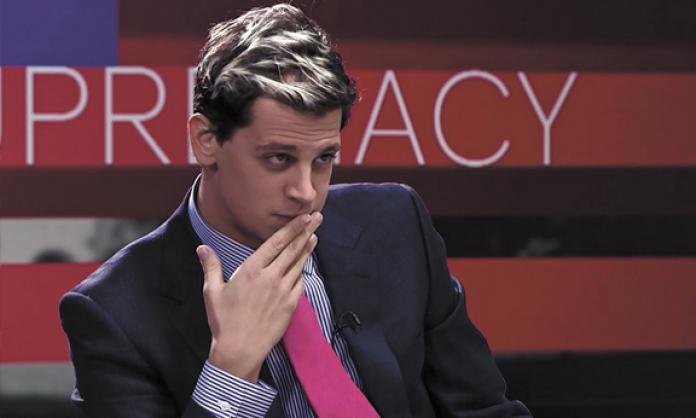“I find humour in breaking taboos and laughing at things that people tell me are forbidden to joke about.” That’s Milo Yiannopoulos, media commentator and former tech editor at Breitbart, the Trump-supporting media platform at which he’s published such articles as “Birth control makes women unattractive and crazy”.
He’s also gay, promotes his Jewish lineage (though he identifies as Catholic) and advertises his interracial marriage, identities which he channels into a flamboyant public persona that he cynically uses to shield himself from criticism for being racist or far right. As shown in the quote above, he deflects criticism by saying that all he’s doing is making light of the stuffy seriousness of bleeding heart liberals and their political correctness.
Over the last two years, Yiannopoulos has become one of the most prominent personalities of the alt-right, a global hodgepodge of neo-Nazis, men’s rights activists, white supremacists and online trolls. He’s famous for targeting Black Lives Matter activists, prominent liberals such as African-American journalist Shaun King, and African-American celebrities – such as his incessant bullying of Ghostbusters actor Leslie Jones, against whom he directed his loyal fan base to make repeated racist, sexist and transphobic slurs.
In December, Yiannopoulos will be visiting Australia as part of his so-called Troll Academy tour.
Yiannopoulos is no mere troll: a recent Buzzfeed News report exposed Yiannopoulos’ links to more unsavoury types, including notorious neo-Nazi Richard Spencer. Buzzfeed reporter Joseph Bernstein wrote an article based on a cache of leaked documents, including emails between Yiannopoulos and former Breitbart editor and Trump adviser Steve Bannon and other far right figures.
In a now famous video, Yiannopoulos is filmed singing “America the Beautiful” while Richard Spencer stands doing a Hitler salute. (Yiannopoulos says that he didn’t see Spencer doing the salute, due to his “severe myopia”.)
This damning exposé hasn’t stopped the Australian media from giving him ample attention, with interviews in the Fairfax press, the Daily Mail and a live interview on Sunrise.
Yiannopoulos hasn’t come from nowhere; he’s the product of a global movement of the far right, which is making gains in country after country. He didn’t emerge in a typical fashion, through the existing far right or white nationalist organisations: he gained notoriety through his involvement in the “Gamergate” scandal, in which several women in the video game industry faced death and rape threats. Since then, he has made a career out of building connections with white supremacists and neo-Nazis.
His speaking engagements attract large crowds, not just of fans but of those on the left who oppose him. A common argument against building opposition campaigns against Yiannopoulos is that he thrives on the attention. It’s an argument anybody involved in anti-fascist campaigning regularly hears. But with Yiannopoulos, it’s an argument that can carry more weight because he thrives on publicity and provocation.
But as Jeff Sparrow recently argued in the Guardian, “Whether we like it or not, Yiannopoulos will provoke someone, simply because that’s what Yiannopoulos does”. As evidenced by the range of interviews he’s already done with the Australian press, Yiannopoulos will get publicity whether we like it or not. So if we don’t put forward an anti-racist, anti-fascist opposition, the only narrative we’ll get when he arrives is the one he frames in the media.
Protesting against Yiannopoulos when he tours Australia in December is also about building a movement like the one emerging in the United States – all around the country, far right rallies and events are being outnumbered and shut down because of the sheer size of the opposition.
For example, 40,000 Bostonians came out against a far right demonstration a week after a white supremacist ran over and killed anti-racist activist Heather Heyer in Charlottesville, Virginia.
By mobilising against Yiannopoulos, we can lay the basis for an ongoing campaign that can beat back the far right in Australia.








